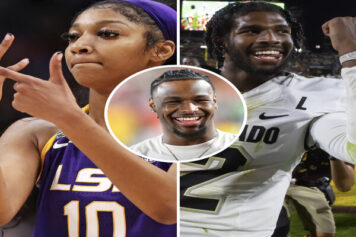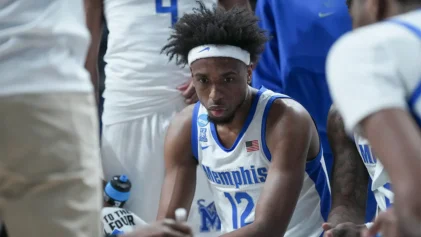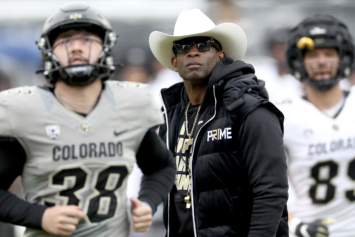NCAA players were using the #NotNCAAProperty hashtag on the eve of “March Madness.” This after not having a tourney at all in 2020 as the global pandemic shot it down totally.
Money, Power, and Control is what the NCAA feeds off of and they in no way, shape or form want to relinquish any of that and especially not for the betterment of the Black athlete.
They love to tell the student-athletes that they’re basically being paid with their education and other amenities such as housing, food, etc. But in actuality, they’re making billions off the names, likenesses and images of thousands of athletes.
If Passed, the New NIL Bill Could Mean Major Changes To Athletic Compensation. The congressmen who introduced the bill said back in September of 2020 that they hoped to bring the bill to a vote sometime in early 2021.
Current NCAA rules still prohibit college athletes from accepting any payment from a third party in exchange for the use of his or her name, image and likeness (NIL). In the past year, more than two dozen states have passed or proposed laws that would make it illegal for colleges to enforce the NCAA’s current NIL rules. Those changes will go into effect in some states as early as July 2021.
The NCAA responded by making plans to change its current rules and by asking Congress to create a federal law, which would avoid differences in state laws that might give one group of schools an advantage over others when recruiting future athletes. That request came with some suggested “guardrails” that college sports leaders say are designed to keep endorsement deals from becoming thinly-veiled salaries or recruiting tools.
A new Congressional bill is the latest piece of legislation that is challenging the NCAA’s longstanding amateurism model. The bill itself is known as the College Athlete Economic Freedom Act, is authorized by Senators Chris Murphy (D-Conn) and Lori Trahan (D-Mass). Trahan is a former NCAA D-1 athlete, having played volleyball at Georgetown University. Murphy on the other hand has been very outspoken about athletes’ rights, publicly criticizing the NCAA’s treatment of them.
RELATED: Allowing Athletes To Side Hustle Won’t Hurt College Basketball One Bit
As the bill was announced, Murphy stated the following: “Big-time college athletics look no different than professional leagues, and it’s time for us to stop denying the right of college athletes to make money off of their talents.”
NCAA Getting Paid While Players Work & Wait
The 2021 NCAA Tournament seems to be going off without a hitch on the men’s and women’s side. The ratings are solid and the excitement has returned to college hoops after a year off due to the pandemic. However, the festivities are just a temporary distraction from larger issues that the NCAA still refuses to face concerning its revenue-generating student-athletes.
While the collegiate sports world continues to closely monitor the actions of the federal government and the growing push to enact federal legislation related to a student-athlete being compensated for use of his/her name, image and likeness (“NIL”), the states are not waiting to address these important issues.
Despite two recently filed bills by Senators Booker (D-NJ) and Blumenthal (D-CT) and a less expansive one from Senator Murphy (D-CT), the inaction from Congress and the NCAA related to NIL legislation has not stopped the shot clock from running on other state legislatures who continue to search for solutions related to the NIL dilemma. States have become privy to the immediacy of NIL legislation and the necessity to keep their schools competitive across the college sports landscape.
Iowa is the most recent state to realize the importance of addressing this issue. Earlier this month, Iowa State Senators Nate Boulton (D) Brad Zaun (R) co-sponsored Senate File 245 (the “Iowa Bill”), a proposed law related to compensation for college athletes.
If Iowa’s NIL bill passes, the bill will become only the second enacted law in the U.S., as it is set to take effect on July 1, 2021 and join Florida’s “Intercollegiate Athlete Compensation and Rights” (the “Florida Bill”)
I ask the question: If predominantly white coaches and executives can have unfettered endorsement deals, why shouldn’t predominantly Black athletes be afforded the same opportunity?
If passed, this bill would allow college athletes complete control of their name, likeness and image. Additionally, the bill would allow athletes to strike up group licensing agreements, and that in turn would allow their names to be used in video games and jersey sales.
READ MORE: Jalen Rose: “NCAA’s Financial Dominance Over Its Athletes Is Steady Crumbling”
This, right after EA Sports announced that its popular NCAA college football game would make a comeback after it was shut down in 2013 after college football players filed a lawsuit against the company for using their likenesses without any compensation.
This bill would also give recruits access to all NIL rights, allowing usage of agents to strike NIL deals while preventing the NCAA from having complete control over athlete representation and compensation. Furthermore, if the NCAA or any specific college or conference in the NCAA were to violate any of these laws, athletes would then have the right to take legal action against any violating parties.
This bill is just the latest piece of proposed legislation looking to end amateurism in all NCAA athletics. In fact last year, a group of senators led by Corey Booker (D-NJ), announced that they would move forward with their proposal of a “College Athletes Bill Of Rights.” That would grant NCAA athletes certain rights as it relates to monetary compensation, health, and eligibility.
While several states have been able to pass their own NIL legislation, the NCAA as a governing body has been its procrastinating self when it pertains to anything that could help or benefit the Black athlete. They have no desire to create their own legislation on this matter which is why they’re dragging their collective feet in the process.
And again, this is in large part due to conflicting views between the Democrats and Republicans, on how to handle the issue. That coupled with the host of new challenges the COVID-19 pandemic has created for collegiate athletics.



